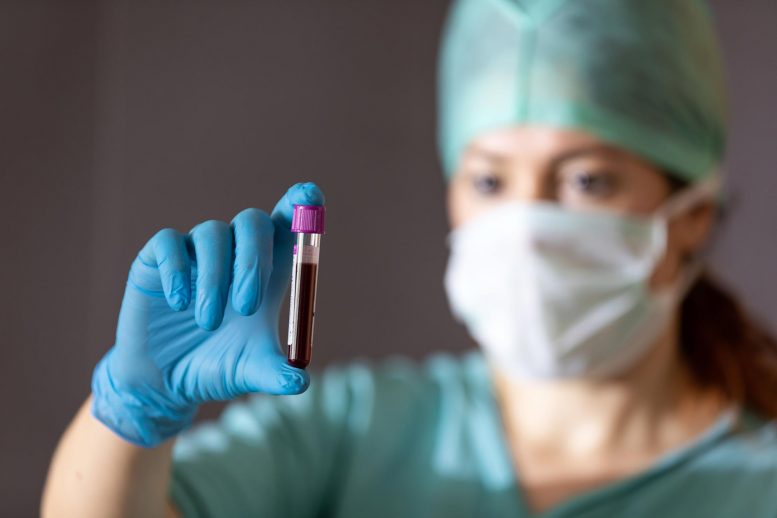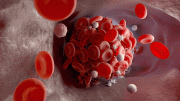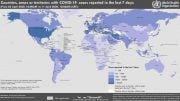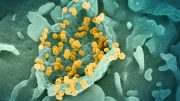
Studies suggest people with blood type O may have a lower risk of COVID-19 infection and a reduced likelihood of severe outcomes if they do get sick.
Individuals with blood type O may have lowest risk of infection; individuals with A and AB may have increased risk of severe clinical outcomes.
Two studies published today (October 14, 2020) in Blood Advances suggest people with blood type O may have a lower risk of COVID-19 infection and reduced likelihood of severe outcomes, including organ complications, if they do get sick.
As the pandemic continues, the global biomedical research community is working urgently to identify coronavirus risk factors and potential therapeutic targets. The potential role of blood type in predicting risk and complications of COVID-19 infection has emerged as an important scientific question. These new studies add evidence that there may be an association between blood type and vulnerability to COVID-19; however, additional research is needed to better understand why and what it means for patients.
Individuals with blood type O may be less vulnerable to COVID-19 infection
Blood type O may offer some protection against COVID-19 infection, according to a retrospective study. Researchers compared Danish health registry data from more than 473,000 individuals tested for COVID-19 to data from a control group of more than 2.2 million people from the general population. Among the COVID-19 positive, they found fewer people with blood type O and more people with A, B, and AB types.
The study results suggest that people with blood types A, B, or AB may be more likely to be infected with COVID-19 than people with type O. The researchers did not find any significant difference in rate of infection between A, B, and AB types. Since blood group distributions vary among ethnic subgroups, the researchers also controlled for ethnicity and maintained that fewer people with blood type O tested positive for the virus.
“It is very important to consider the proper control group because blood type prevalence may vary considerably in different ethnic groups and different countries,” said study author Torben Barington, MD, of Odense University Hospital and the University of Southern Denmark. “We have the advantage of a strong control group – Denmark is a small, ethnically homogenous country with a public health system and a central registry for lab data – so our control is population-based, giving our findings a strong foundation.”
Blood groups A and AB associated with increased risk of severe clinical outcomes of COVID-19 infection People with blood groups A or AB appear to exhibit greater COVID-19 disease severity than people with blood groups O or B, according to a separate retrospective study. Researchers examined data from 95 critically ill COVID-19 patients hospitalized in Vancouver, Canada. They found that patients with blood groups A or AB were more likely to require mechanical ventilation, suggesting that they had greater rates of lung injury from COVID-19. They also found more patients with blood group A and AB required dialysis for kidney failure.
Together, these findings suggest that patients in these two blood groups may have an increased risk of organ dysfunction or failure due to COVID-19 than people with blood types O or B. Furthermore, while people with blood types A and AB did not have longer overall hospital stays than those with types O or B, they did remain in the intensive care unit (ICU) for a longer average time, which may also signal a greater COVID-19 severity level.
“The unique part of our study is our focus on the severity effect of blood type on COVID-19. We observed this lung and kidney damage, and in future studies, we will want to tease out the effect of blood group and COVID-19 on other vital organs,” said study author Mypinder S. Sekhon, MD, of the University of British Columbia. “Of particular importance as we continue to traverse the pandemic, we now have a wide range of survivors who are exiting the acute part of COVID-19, but we need to explore mechanisms by which to risk stratify those with longer-term effects.”
References:
“Reduced prevalence of SARS-CoV-2 infection in ABO blood group O” by Mike Bogetofte Barnkob, Anton Pottegård, Henrik Støvring, Thure Mors Haunstrup, Keld Homburg, Rune Larsen, Morten Bagge Hansen, Kjell Titlestad, Bitten Aagaard, Bjarne Kuno Møller and Torben Barington, 14 October 2020, Blood Advances.
DOI: 10.1182/bloodadvances.2020002657
“The association of ABO blood group with indices of disease severity and multiorgan dysfunction in COVID-19” by Ryan L. Hoiland,Nicholas A. Fergusson, Anish R. Mitra, Donald E. G. Griesdale, Dana V. Devine, Sophie Stukas, Jennifer Cooper, Sonny Thiara, Denise Foster, Luke Y. C. Chen, Agnes Y. Y. Lee, Edward M. Conway, Cheryl L. Wellington and Mypinder S. Sekhon, 14 October 2020, Blood Advances.
DOI: 10.1182/bloodadvances.2020002623









I was curious if the Rh factor had been studied along with blood types.
Good Question especially negitive O rh negitive
You know what would have been great in this article? Some indication of how big the difference is between O-type and non-O-type patients’ outcomes. Are non-O patients 5% more likely to have a bad outcome? Twice as likely? 100 times as likely? It makes a difference.
Yes I would like to know also if RH factor plays a role in the study, as well as the differentiations between percentages of cases studied.
I have no idea if you guys the scientist will ever read this but I have an idea to cure the virus. Now I’m not as smart as the others but I don’t have to be. I was once told don’t use statics you imagination. if you can imagine what the virus is doing and then find the problem(the thing that causes it the thing that makes it spread) after you find the problem then you remove the thing that is causing it now I’m not a rocket scientist but I’m smart enough to put two together. I’m not posting this to agervate the scientist I just want to make the world a better place. I hope it works you the scientist are so brilliant ever since I look up to you scientist.
Since they were looking at blood type, why didn’t they list all the existing blood types and the percentage of cases, as well as the list of ailments they suffered. That would be a more rigorous study, in my opinion.
I have no idea if you guys the scientist will ever read this but I have an idea to cure the virus. Now I’m not as smart as the others but I don’t have to be. I was once told don’t use statics you use imagination. if you can imagine what the virus is doing and then find the problem(the thing that causes it the thing that makes it spread) after you find the problem then you remove the thing that is causing it now I’m not a rocket scientist but I’m smart enough to put two together. I’m not posting this to agervate the scientist I just want to make the world a better place. I hope it works you the scientist are so brilliant ever since I look up to you scientist.
This may be a new publication of this study.
This study has been reported before so it would be helpful to know when it was first reported as new information.
Yes, I as well would like to know about the Rh factor. It’s a critical component for a female who is Rh negative and it’s hard to understand why they did not include this in their study and my opinion is its not a strong study if the did not include all blood types…respectfully A-
Thanks for nothing.
This just causes anxiety.
Does not provide answers for those blood type groups.
So we have a target on our body.
Ras; your comment to Alina was innapropriate. Alina is probably a child. The way it was worded…she may be a child just trying to help. Uuugh.
Salinas, I completely agree with you that Ras, that was absolutely uncalled for. The world is negative enough without publicly insulting others. If you are an adult please act like one!!
I really dislike news publications that make an assessment but don’t provide any data. As far as I’m concerned this is an opinion piece until it cites some actual numbers.. not to mention, any numbers coming from a study of 95 people could be misleading.
And yes, clearly the person Alina made a silly comment, but Ras’s response is unnecessary and rude.
Not a bad Study at all, though I’d have loved it more if it depicted the specifics in the set of two ranges of the Blood Groups ie. what’s in the A or AB which make them more susceptible than in O or B!
Researchers must continue exploring on this as well.
I have B negative where does that come in
What if someone with type O blood has a pre existing condition as epilepsy wouldn’t they have a even bigger risk of getting COVID-19 regardless of how healthy they are?
Do we know the %of each blood group of the population.?
Sounds very scientific, yet the results sound like clickbait. “More” and “less” are meaningless conclusions without magnitudes and variation.
…to say that type 0 is immune due to them having less case is quite wrong. Type 0 is the least common type hence why type 0 individual had the most difficulty at getting a blood transfusion due to them requiring the same type only. It is rare type of blood. Type 0- rh is even rareier as those type cannot receive from anyone other than type 0- rh. To says that blood type can be immune is like saying different type of chicken is immune to chicken flu.
For more details please look here:
https://ashpublications.org/bloodadvances/article/4/20/4990/463793/Reduced-prevalence-of-SARS-CoV-2-infection-in-ABO
This is more panic porn. Yesterday they told us masks are useless and everyone is going to be infected. The WHO just reversed itself on lock downs saying they cause more harm than good. These scientists are like chickens running around with their heads cut off.
Sorry Kik, but type O is actually the most common blood type and AB is the least common. These studies do not indicate anything about immunity, but are indicators of susceptibility and strength if you will. These studies show a general relationship that indicates that if you have type O blood you may be less likely to get Covid-19 and if you do get it, you may be less likely to have serious complications. Anybody can contract the virus, nobody is immune to it until they’ve at least been exposed to it and their immune systems have had a chance to react to it. Not even a vaccine will provide the protection that natural exposure to the real virus will.
I remember reading a couple weeks ago a harvard study that found no links existed between covid and blood types.now we get the opposite. Could this just be fear stoking and confusion now that the second wave has begun?
Second wave just begun? When did the first one end?
Everyone keeps talking about second wave and I don’t understand why. From what I can see this has just been one long pandemic with no waves. A wave would be that it was gone or close to gone and came back. It never left why are scientist using the term second wave are they trying to sound like we got somewhere from the first or are they trying to hype up anxiety. As the latter is what is happening everyone is panicking about the dreadful second wave when the first never ended.
As for this article I agree a percentage and rh factor would be nice. Also how were these tests concluded? Did they take blood samples and infected or just looked at data for those who were already infected? And what numbers 100 or 1000 tests performed on each type. Much info is lacking making me think this might just be click bait
Arent there fewer people with blood type O in general it would stand to reason less people with blood type o have covid.
0 blood type is the ,,original,, so called Blood type. Is the most common type of blood. As a negative O blood type i did little research from Out of country. Not followed only the US media . 0 negative should be blood type safe from Covid19. Just based on my private study . Anyway, in case someone want to try one thing I learn as a tip to protect yourself in case you in public: boil water in a pot,put some baking soda in and inhale the steam by covering yourself with larger towel. I do it and for now it works. Baking soda is amazing thing keeping your body neutral PH balance. Please do not criticize my comment as someone above did nasty reply already to someone else. Read it and either use it or not. Be NICE PLEASE. That’s the most how we can help each other for now. Thank u.
If O positives are less likely to catch, or suffer devastating affects from COVID if infected, maybe O positives should be allowed to move freely, congregate, and engage in all normal activities to get the US if not world wide economies back on their feet. I believe O positive is the predominate blood type. Why keep the majority of the population hiding in fear and suffering mentally, physically, and financially?
That is not True I am O blood Type so I say this story is totally false !
My blood type is O, this is a study i don’t believe at all after surviving COVID myself
I’m O-positive, the most common blood type. I contracted ‘mild’ covid in the middle of April, had no serious lung problems (although I don’t have wonderful lungs – history of whooping cough as a child/pleurisy as a young adult and pneumonia five years ago). Fatigue/chest pressure and subsequently and still have it but gradually going dysautonomia and deconditioning with cardiac issues. But in terms of the covid episode per se (as opposed to post-viral issues) it was not serious, and I’m 73. No existing health conditions,previously very fit and physically active, long distance walker. Currently returning to walking a mile a day at least, and hoping to overcome deconditioning and cardiac issues asap.
I too would like to know about blood type I have to give my my own blood for myself when I have a surgery in case I need a blood transfusion because I have rare blood I been told that no one blood compatible with mine so before surgery I give my own blood just in case.n
Please disable comments. The more of them I read, the more I realize how doomed humanity is. (Sigh)
I would like to know if A+, is grouped with A?
The world is falling apart and mean people suck be nice to each other and you will feel better about your self
Correlation is not causation. What a garbage article.
I agree with your comment
We are living in a crazy world
And there are so many negative people just be nice to each other and respect
Like other research quoted on the internet…the story gave little substance with a big helping of fear. The end point of this study? There is no end point! It’s just fine to continue draconian quarantine measures & if folks have to get out…wear your filthy mask & distance yourself from all human contact. All studies & doctor commentary that contradict mask wearing & social distancing are absent. Once inawile one slips out. I saw one doctor on YouTube say that wearing these flimsy masks to stop the virus is like trying to stop bugs from coming into your yard by using a chain link fence! The cure is worse than the disease. We have tweens, teens & young adults (1 in 4 thinking of committing suicide) in isolation that don’t need to be. They are missing out on school, socializing, dances & activities that make those teen years bearable! Also, teen years give us some of our most enduring memories & relationships (I just had dinner with my childhood BF a few days ago. Weve been friends for 41 years.)In all of America only 1 healthy teen, aged 17, with no underlying illness has died from the China virus. We have vast amounts of suicide deaths with scary increases with adults too… we have deaths from heart attacks(as going to any medical center is a hassle.) We have deaths from Cancer being undiagnosed as all our resources go to a virus that is 95% survivable if you are under 45 & healthy. What’s the deal with testing? We didn’t do 1/10th of this for the swine flu. In history, with a pandemic,the emphasis has been on the death rate & survivability…not this morbid fascination our media has for infection rate. Now there is a infection chart the media is using with obnoxious Ronald McDonald colors,orange red & yellow, to continue the scare tactics. This is nothing more than to control our behavior. DR. Fauchi tooting “this is our new normal” staying at home with no hope for anyone of human contact beyond the screen of a smart phone. Not this wee sheep. I’m bleating loud & clear, resisting my mask (as I want to catch this virus to add to my immune collection) and ready for bars, restaurants, theatres & cruises to name a few to open up. We have survived thousands of years full of disease…and we endure.
For those of you saying, “It would be nice to see the numbers,” you can click on the studies linked at the end of the article. Even if you don’t want to wade through the study itself, there’s a graphic at the beginning of each one that should answer your questions.
Also, this article was written by someone at Sci Tech Daily, not the authors of the studies.
Skillet,
Please keep your uninformed ranting on Twitter and FB. No one here wants to hear your conspiracy opinions. Discuss the merits of the article, the quality of the writing, or the facts.
Skillet,
Please keep your uninformed ranting on Twitter and FB. No one here wants to hear your conspiracy opinions. Discuss the merits of the article, the quality of the writing, or the facts.
A similar article from China was written back in the spring, with the same results, and another study done by Columbia (I could be wrong, but it was an Ivy League) in the summer. All had similar results. The study from China had the numbers and percentages, if anyone is interested in googling it.
I finally found the data. The difference in susceptibility is a little over 10%. Here is the summary from the report:
” Together, these data indicate that the RRs for contracting SARS-CoV-2 are 0.87 (95% CI, 0.83-0.91), 1.09 (95% CI, 1.04-1.14), 1.06 (95% CI, 0.99-1.14), and 1.15 (95% CI, 1.03-1.27) for O, A, B, and AB individuals, respectively.”
Skillet Black. VERY GOOD COMMENT.
I think the writer assumes that the reader understands blood type 0. Corona virus is less severe in type O blood because its a universal blood type. I am type O. That means I can receive any blood type and any blood type can receive mine. Normally you have to match up blood types when their is a blood transfusion transplant but not with my blood type. Read my next comment about blood types
Quick facts about O-
7% of the population has O- blood.
O- blood is the blood type in the highest demand.
O- blood is the preferred blood type for people with underdeveloped immune systems, including premature babies and cancer patients.
The preferred donation methods for O- donors are Double Red Blood Cell and Whole Blood. These two donation types allow O- donors to maximize their donation and make the largest impact for patients in need.
For emergency transfusions, blood group type O negative blood is the variety of blood that has the lowest risk of causing serious reactions for most people who receive it. Because of this, it’s sometimes called the universal blood donor type.
Blood group types are based on proteins called antigens that are present on red blood cells. There are major antigens and minor antigens coating the red blood cells. Based on the major antigens, blood groups may be classified as one of these four types
Type A
Type B
Type AB
Type O
Blood is also classified by rhesus (Rh) factor. If your blood has the Rh factor, you’re Rh positive. If your blood lacks the Rh factor, you’re Rh negative.
Ideally, blood transfusions are done with donated blood that’s an exact match for type and Rh factor. Even then, small samples of the recipient’s and donor’s blood are mixed to check compatibility in a process known as crossmatching.
In an emergency, type O negative red blood cells may be given to anyone — especially if the situation is life-threatening or the matching blood type is in short supply.
Distribution of blood types
O-positive: 38 percent.
O-negative: 7 percent.
A-positive: 34 percent.
A-negative: 6 percent.
B-positive: 9 percent.
B-negative: 2 percent.
AB-positive: 3 percent.
AB-negative: 1 percent.
Distribution of blood types
O-positive: 38 percent.
O-negative: 7 percent.
A-positive: 34 percent.
A-negative: 6 percent.
B-positive: 9 percent.
B-negative: 2 percent.
AB-positive: 3 percent.
AB-negative: 1 percent.
O-positive: 38 percent
O-negative: 7 percent
A-positive: 34 percent
A-negative: 6 percent
B-positive: 9 percent
B-negative: 2 percent
AB-positive: 3 percent
AB-negative: 1 percent
45% of the US population has type O
55% have type A B or AB
FOR THE FEMALE THAT WAS ASKING ABOUT RH-( NEGATIVE BLOOD TYPE) IT WONT BE INCLUDED IN ANY STUDIES BECAUSE RH-,(NEGATIVE) BLOOD TYPE CANT BE TRACED IT HAS NO ORIGIN AN IS ONLY BLOOD TYPE THAT CANT BE CLONED .